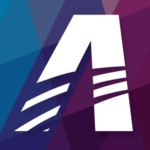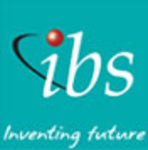Best Airline Reservation System
Best airline reservation systems are PROVAB TECHNOSOFT, Lemax, Travelopro, Trawex Cloud, Blue Sky Booking, and Resfinity. These airline reservation software automate ticket booking, improving airline customer relationships.



No Cost Personal Advisor
List of 20 Best Airline Reservation System
Contenders | 2024
System by PROVAB TECHNOSOFT
Provab Technosoft provides airline reservation systems with a global presence. It offers numerous B2B and B2C travel portal solutions, from travel agencies to individual APIs. Headquartered in India, it provides various services such as high-tech support to agencies and DMCs, different online reservation systems, and multiple inventories of rental cars, hotels, flights, etc. Read PROVAB TECHNOSOFT Reviews
Explore various PROVAB TECHNOSOFT features, compare the pricing plans, and unlock the potential of seamless operations by selecting the right software for your business.
Features
View all PROVAB TECHNOSOFT Features- Group Reservations
- GDS/OTA Integration
- Promotions Management
- CRM
- Extended Stay
- Vacation Rental
- Booking Notes
- Employee Management
PROVAB TECHNOSOFT Caters to
- StartUps
- SMBs
- Agencies
- Enterprises
Contenders | 2024
Software for tour operators and travel agencies
Lemax is an airline reservation software provider that serves travel agencies and DMCs. The deployment of this software automates and streamlines airline operations. It increases the speed of tour organizing and flight and hotel booking processes, allowing the company to make more sales and generate more revenue. It also ensures a better user experience. Read Lemax Reviews
Explore various Lemax features, compare the pricing plans, and unlock the potential of seamless operations by selecting the right software for your business.
Features
View all Lemax Features- Customizable Reporting
- Accommodation Booking
- Price Margin Management
- Third Party Booking
- Payment Processing
- CRM
- Booking Notes
- Quote Management
Lemax Caters to
- StartUps
- SMBs
- Agencies
- Enterprises
Emergents | 2024
System by Enoyaone
AeroCRS is a highly featured and one of the best airline reservation systems available, as it is extremely advanced and easy to accommodate. Assistive tools are provided for effectively managing inventory, processes, clients, organizations, etc. The adaptability provided is quick, and training the workforce takes practically no time, making it the best airline ticketing software. Learn more about AeroCRS
Explore various AeroCRS features, compare the pricing plans, and unlock the potential of seamless operations by selecting the right software for your business.
Features
View all AeroCRS Features- Distribution Management
- Payment Processing
- CRM
- Revenue Management
- Third Party Booking
- Charter Reservations
- Loyalty Program
- Online Booking
AeroCRS Caters to
- StartUps
- SMBs
- Agencies
- Enterprises
Emergents | 2024
System by Radixx
With over two decades of market presence, Radixx is one of the best airline reservation systems. It has a tailored and dedicated product for each service like internet booking, passenger service system, departure service, etc. The company's main motto is to assist airlines in being profitable and providing the finest user experience by achieving operational excellence. Learn more about Radixx Galaxy
Explore various Radixx Galaxy features, compare the pricing plans, and unlock the potential of seamless operations by selecting the right software for your business.
Features
View all Radixx Galaxy Features- Payment Processing
- CRM
- Self Service Portal
- Disruption Management
- Loyalty Program
- Departure Control
- Online Booking
- Third Party Booking
Radixx Galaxy Caters to
- StartUps
- SMBs
- Agencies
- Enterprises
Emergents | 2024
System by Videcom
Known as Videcom, VRS has served the aviation and travel sectors since 1972. It is an IATA-affiliated flight reservation system offering ample reservation, tracking, e-booking, and monitoring systems to airlines across the globe. The platform provided by VRS is extremely robust that stabilizes airline processes, and elevates efficiency. Learn more about VRS
Explore various VRS features, compare the pricing plans, and unlock the potential of seamless operations by selecting the right software for your business.
Features
View all VRS Features- Loyalty Program
- Online Booking
- CRM
- Revenue Management
- Departure Control
VRS Caters to
- StartUps
- SMBs
- Agencies
- Enterprises
Category Champions | 2024
World's Leading Travel Technology Company
Travelopro provides assistive technology solutions to every entity involved in the travel business. There are numerous benefits of an airline reservation system, but the most essential of Travelopro is tenable business growth. It is highly dedicated to bringing digital transformation for companies and individuals involved in this sector by deploying cloud-integrated software solutions and other management tools to increase income. Read Travelopro Reviews
Explore various Travelopro features, compare the pricing plans, and unlock the potential of seamless operations by selecting the right software for your business.
Features
View all Travelopro Features- Reservations Management
- Promotions Management
- Client Management
- Flight Booking
- Vendor Management
- Price Margin Management
- Activities Booking
- Payment Processing
Travelopro Caters to
- StartUps
- SMBs
- Agencies
- Enterprises
Category Champions | 2024
Leading travel software company globally
Trawex Cloud is not just an airline reservation company. It provides multiple software solutions of various categories, like e-booking, reservation, sales, and revenue management software, to airlines, travel agencies, and operators. Apart from that, different types of APIs are provided, which elevates the positive user experience and offers a competitive edge to our clients. Read Trawex Cloud Reviews
Explore various Trawex Cloud features, compare the pricing plans, and unlock the potential of seamless operations by selecting the right software for your business.
Features
View all Trawex Cloud Features- Price Margin Management
- Quotes / Estimates
- Client Management
- Activities Booking
- Central Reservation System
- Promotions Management
- Reservations Management
- Custom Packages
Trawex Cloud Caters to
- StartUps
- SMBs
- Agencies
- Enterprises
Emergents | 2024
System by Airmax systems
Airmax System is one of the best airline reservation system providers. It is completely focused on making the business for airlines swiftly operational and profitable. All the solutions are provided and embedded with advanced functionalities and security features, from flight operation systems to crew management. Making the brand unique from its competitors. Learn more about AirMAX System
Explore various AirMAX System features, compare the pricing plans, and unlock the potential of seamless operations by selecting the right software for your business.
Features
View all AirMAX System Features- Customer Support
- Payment Processing
- Online Booking
- Calendar Management
- Accounting
- Self Service Portal
- Appointment Management
- Billing & Invoicing
AirMAX System Caters to
- StartUps
- SMBs
- Agencies
- Enterprises
Emergents | 2024
System by anixe
The majority of the air reservation systems of the company are related to airlines, tour operators, and online travel agencies. But what differentiates this brand is the provision of several dedicated solutions, such as income optimizer, to filter the sales process and ensure increased revenue. Also, accurate data solutions and committed quick e-booking engines are provided. Learn more about Resfinity
Explore various Resfinity features, compare the pricing plans, and unlock the potential of seamless operations by selecting the right software for your business.
Features
View all Resfinity Features- Billing & Invoicing
- Quote Management
- Customer Management
- Payment Processing
- Flight Booking
- Central Reservation System
- Custom Packages
- Reservations Management
Resfinity Caters to
- StartUps
- SMBs
- Agencies
- Enterprises
Emergents | 2024
System by Juniper
Cangooroo Booking Engine is the best airline ticketing software and is completely dedicated to providing B2B and B2C booking engine solutions. Booking solutions are offered for various prospects, such as hotels, flights, tour packages, rental cars, etc. The framework it operated on is so advanced that it rapidly integrated with many suppliers, broadening the product portfolio. Learn more about Cangooroo Booking Engine
Explore various Cangooroo Booking Engine features, compare the pricing plans, and unlock the potential of seamless operations by selecting the right software for your business.
- Vendor Management
- GDS / OTA Integration
- Quotes/Estimates
- Payment Processing
- Promotions Management
- Price / Margin Management
- Third Party Booking
- Reservations Management
Cangooroo Booking Engine Caters to
- StartUps
- SMBs
- Agencies
- Enterprises
Emergents | 2024
System by SkyVantage
SVAMS is an all-in-one airline reservation system that enables airlines to manage their course of business more efficiently and generate revenue. It provides valuable insights based on data collected to increase profit margins significantly. There is also a feature that identifies frequent flyers and allows the airline company to offer loyalty benefits to them. Learn more about SVAMS
Explore various SVAMS features, compare the pricing plans, and unlock the potential of seamless operations by selecting the right software for your business.
Features
View all SVAMS Features- Customer DataBase
- Guest Management
- Accommodation Booking
- Invoices
- Accounting
- Calendar Management
- Online Registration
- Payment Processing
SVAMS Caters to
- StartUps
- SMBs
- Agencies
- Enterprises
Contenders | 2024
System by IBS Software Services
Unlike other air reservation companies, iFly Res offers high-end software that is extremely assistive in driving growth and providing the most unique and effective user experience. Furthermore, management tools for cargo, crew, passenger, and loyalty cover an airline's operations. The company is well-versed in the effective deployment of solutions to accelerate profits. Read iFly Res Reviews
Explore various iFly Res features, compare the pricing plans, and unlock the potential of seamless operations by selecting the right software for your business.
Features
View all iFly Res Features- Charter Reservations
- Distribution Management
- Disruption Management
- Departure Control
- Online Booking
- Loyalty Program
- CRM
- Self Service Portal
iFly Res Caters to
- StartUps
- SMBs
- Agencies
- Enterprises
Emergents | 2024
System by TravelTECH
IRS, an airline reservation system that is centralized and offers a wide range of advanced features, escalates an organization's growth. All the services are provided, from air tickets to car rentals, to ease and optimize the process. Real-time insights on data are offered that assist in effective decision-making. Learn more about IRS
Explore various IRS features, compare the pricing plans, and unlock the potential of seamless operations by selecting the right software for your business.
Features
View all IRS Features- CRM
- Payment Processing
- Online Booking
IRS Caters to
- StartUps
- SMBs
- Agencies
- Enterprises
Emergents | 2024
System by Results Reservation Technologies
Results Reservation System is a fully featured Airline Reservation Software designed to serve Enterprises, Startups. Results Reservation System provides end-to-end solutions designed for Web App. This online Airline Reservation system offers at one place. Learn more about Results Reservation System
Explore various Results Reservation System features, compare the pricing plans, and unlock the potential of seamless operations by selecting the right software for your business.
Results Reservation System Caters to
- StartUps
- SMBs
- Agencies
- Enterprises
Emergents | 2024
Learn Code Free
Dropout Developer offers AI-powered, project-based learning for self-taught programmers. It provides personalized plans, expert guidance, a supportive community, and free resources like tutorials and courses, helping learners succeed without a college degree. Learn more about Dropout Developer
Explore various Dropout Developer features, compare the pricing plans, and unlock the potential of seamless operations by selecting the right software for your business.
Features
View all Dropout Developer Features- AI Email Writers
- AI Productivity
- AI-Assisted Development
- AI Content Generators
- ChatGPT Apps
- AI Marketing
- Conversational AI
- Chatbot
Dropout Developer Caters to
- StartUps
- SMBs
- Agencies
- Enterprises
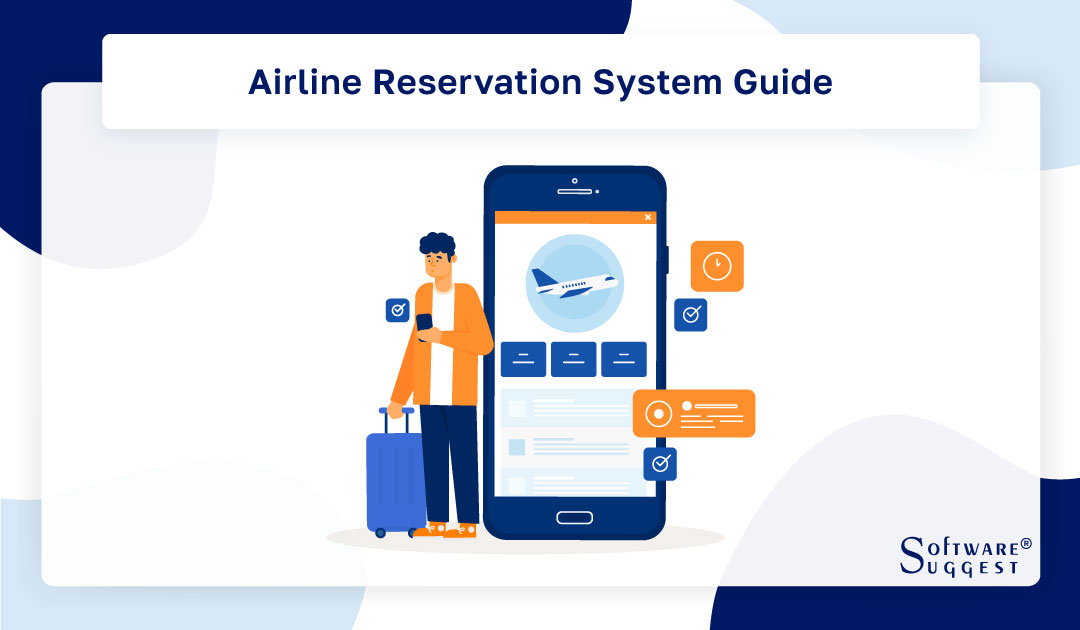
Airline Reservation System Software has revolutionized the way airlines and travel companies manage flight bookings and provide seamless travel experiences to passengers. This sophisticated technology streamlines the entire booking process, from flight availability and seat selection to fare rules and payment processing.
With real-time updates and integration capabilities, Airline Reservation System Software empowers airlines to efficiently manage reservations, expand distribution channels, and optimize revenue generation. Additionally, passengers benefit from user-friendly interfaces, personalized offers, and a more convenient booking experience.
What Is an Airlines Reservation System?
An Airlines Reservation System is a sophisticated software platform that facilitates the process of booking flights and managing airline-related services. It serves as the backbone of an airline's passenger management system, enabling customers to search for available flights, make reservations, and purchase tickets. The system provides real-time updates on flight availability, schedules, and pricing, ensuring that customers have access to accurate and up-to-date information during the booking process.
Moreover, an Airlines Reservation System streamlines the entire booking workflow, allowing airline staff to efficiently manage reservations, assign seats, handle fare rules, and process ticket changes. The system often integrates with other airline systems, such as revenue management, customer relationship management (CRM), and accounting, enabling smooth data flow and seamless operations across the organization.
What are the Types of Airline Management Systems?
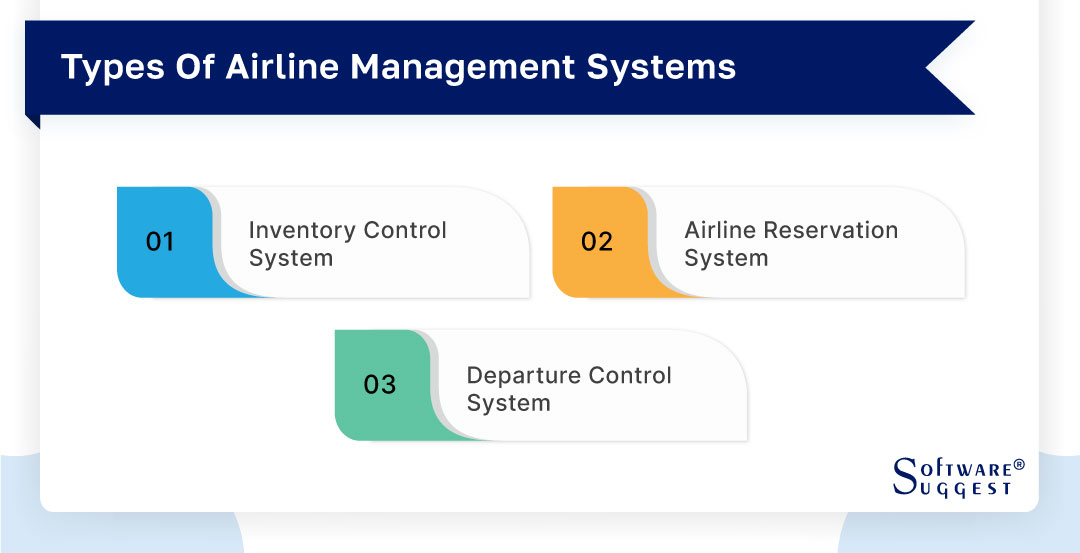
There are three airline management systems: inventory control, airline reservation, and departure control. Let's understand them in detail.
-
Inventory Control System
An inventory control system is a system that allows airlines to control seat availability in different cabins and manage group fares. The airline inventory system opens or closes fare buckets based on the rules set by the company.
In most cases, the inventory system integrates with airline reservation systems and ensures constant information exchange for real-time updates.
-
Airline Reservation System
An airline reservation system is a database for flight schedules, available seats, fares, and rules for each booking class and passenger profile. Apart from storing information, it also helps:
- Manage reservation requests and cancellations
- Display flight schedules, available seats, and prices to passengers and intermediates (third-party booking systems)
- Generate PNRs containing passenger, baggage, and travel details
- Issue tickets (both paper and electronic)
-
Departure Control System
A departure control system is a tool that handles passengers in the airport. It helps airlines make the entire check-in to onboarding process seamless. The DCS system interacts with the airline reservation system to confirm and update booking information in real-time.
With a DCS system, you can:
- Process check-ins from all touchpoints: service counters, web-check in, kiosks, and self-check-in
- Manage baggage (including checking weights and loading on flights)
- Generate and print baggage tags
- Share necessary information with security services
- Generate load sheets that contain balance data and load weight of the particular flight (including aircraft's weight, fuel, crew & passenger details, baggage, cargo, mail, and pantry).
Different Types of Airline Reservation System Software
In the modern era of aviation, the airline industry heavily relies on sophisticated software systems to manage its operations and cater to the needs of travelers. These systems, collectively known as Airline Reservation System Software, play a vital role in streamlining various aspects of the airline business, from booking flights to optimizing revenue and ensuring smooth flight operations. Let's explore each type of Airline Reservation System Software and its key functionalities:
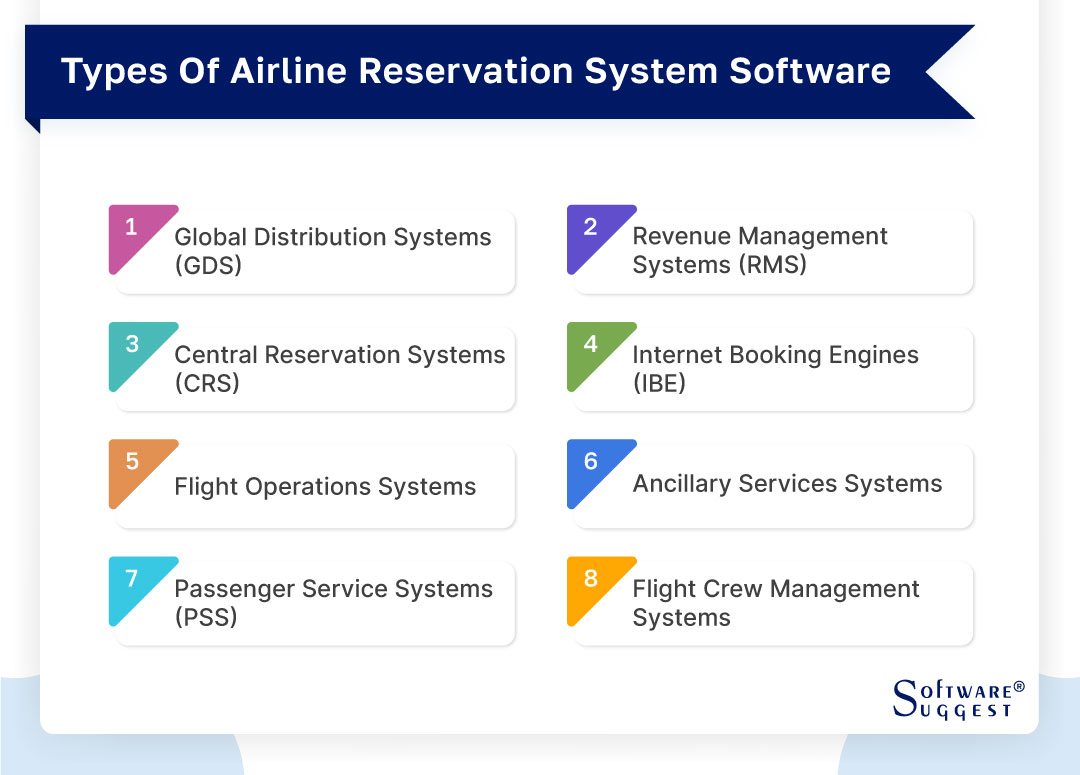
-
Global Distribution Systems (GDS)
Global Distribution Systems are centralized platforms that enable travel agencies and online booking platforms to access real-time information about flight availability, schedules, and pricing from multiple airlines. GDS facilitates seamless bookings and reservations across different carriers, providing a vast inventory of flight options to travelers. It acts as a crucial intermediary between airlines and travel agents, ensuring efficient distribution of airline seats to a global audience.
-
Revenue Management Systems (RMS)
Revenue Management Systems are sophisticated tools that use data analytics and predictive modeling to optimize flight pricing and maximize revenue. These systems consider various factors, such as demand patterns, booking trends, and market conditions, to dynamically adjust fares and offer competitive pricing. RMS helps airlines make data-driven decisions to improve seat occupancy and yield, ensuring optimal revenue generation.
-
Central Reservation Systems (CRS)
Central Reservation Systems serve as a core component of an airline's reservation infrastructure, handling reservations, inventory management, and ticketing. CRS consolidates flight data and manages bookings across various sales channels, including online platforms and travel agencies. It provides a centralized database for seamless information flow and real-time updates to both customers and airline staff.
-
Internet Booking Engines (IBE)
Internet Booking Engines are customer-facing platforms that allow travelers to directly search for flights, compare fares, and make reservations through an airline's website or mobile app. IBE provides a user-friendly interface, enabling customers to easily navigate through available flight options, choose seats, and complete the booking process independently.
-
Flight Operations Systems
Flight Operations Systems assist airlines in managing the operational aspects of flights. These systems handle flight planning, crew scheduling, aircraft maintenance, and communication with air traffic control. Flight Operations Systems ensure that flights operate safely, and efficiently, and adhere to all regulatory requirements.
-
Ancillary Services Systems
Ancillary Services Systems are designed to manage and promote additional services beyond the basic flight ticket, such as baggage fees, in-flight meals, and extra legroom. These systems allow airlines to offer ancillary products to customers during the booking process, increasing revenue opportunities.
-
Passenger Service Systems (PSS)
Passenger Service Systems are comprehensive platforms that manage passenger-related functions, including check-in, boarding, loyalty programs, and customer service. PSS ensures a seamless travel experience for passengers from the moment of check-in to post-flight services.
-
Flight Crew Management Systems
Flight Crew Management Systems handle crew scheduling, training, and other administrative tasks related to flight crew members. These systems ensure that the airline has adequately trained and assigned crew members for each flight, maintaining compliance with regulations and operational efficiency.
How does an Airline Reservation System Work?
Airline reservation systems work by allowing airlines to manage their schedules, flight inventory, and prices. They also allow airlines to communicate with customers about their reservations.
It helps consolidate flight plans to show the available seats for specific destinations. Customers can then choose the most feasible option to book tickets. As soon as the payment is made, the system blocks the seat (if the passenger has booked a specific one) so no other customer can choose the same sitting space.
Airlines can also sell tickets offline, check in passengers, track their baggage, process flight plans, and monitor reservations. In addition to the essential functions of flight booking software, an airline may offer additional services such as frequent flyer program membership management and crew scheduling.
Who Are the Users of Airline Reservation Software?
Airline Reservation Software serves as the backbone of the aviation industry, facilitating the entire booking process and ensuring seamless travel experiences for travelers worldwide. It caters to a diverse range of users who play critical roles in the travel ecosystem. Let's explore the different users of flight Reservation Software and their specific roles and interactions with the system:
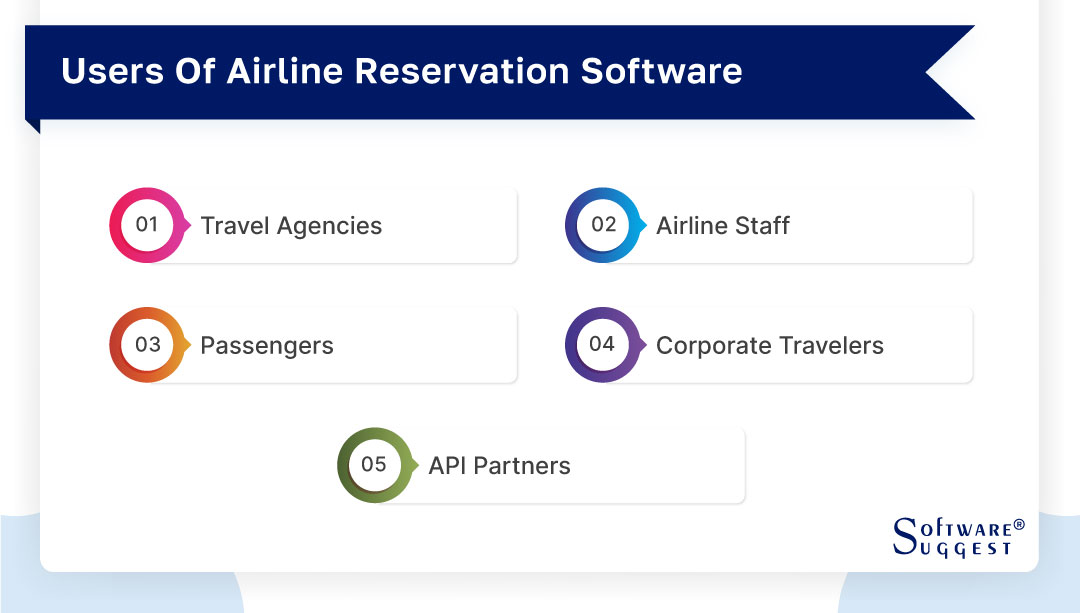
-
Travel Agencies
Travel agencies are key users of Airline Reservation Software, especially Global Distribution Systems (GDS). GDS platforms enable travel agents to access real-time flight information, compare fares, and make bookings on behalf of their customers. Travel agencies act as intermediaries between airlines and passengers, providing valuable assistance in itinerary planning, ticketing, and other travel-related services.
-
Airline Staff
Airline Reservation Software is extensively used by airline staff, including reservation agents, ticketing agents, and ground handling personnel. These staff members utilize Central Reservation Systems (CRS) to manage bookings, seat assignments, ticket changes, and other passenger-related services. Additionally, airline staff relies on Flight Operations Systems for flight planning, crew scheduling, and operational coordination.
-
Passengers
Passengers are the end-users of Airline Reservation Software, particularly Internet Booking Engines (IBE). Passengers interact directly with the IBE on airline websites or mobile apps to search for flights, select seats, and book tickets for their desired travel dates and destinations. Airline Reservation Software aims to provide passengers with a user-friendly and efficient booking experience.
-
Corporate Travelers
Corporate Travelers, representing business professionals traveling for work purposes, often use specialized airline reservation tools. Corporate travel management software, integrated with Airline Reservation Software, allow businesses to set travel policies, manage expenses, and facilitate streamlined booking processes for their employees' business trips.
-
API PartnersApi
Airline Reservation Software often integrates with various Airline API (Application Programming Interface) partners, including third-party platforms and travel technology providers. These partners use APIs to connect their systems with the Airline Reservation Software, enabling seamless data exchange and providing enhanced services to their customers.
What are the Benefits of Flight Booking Systems?
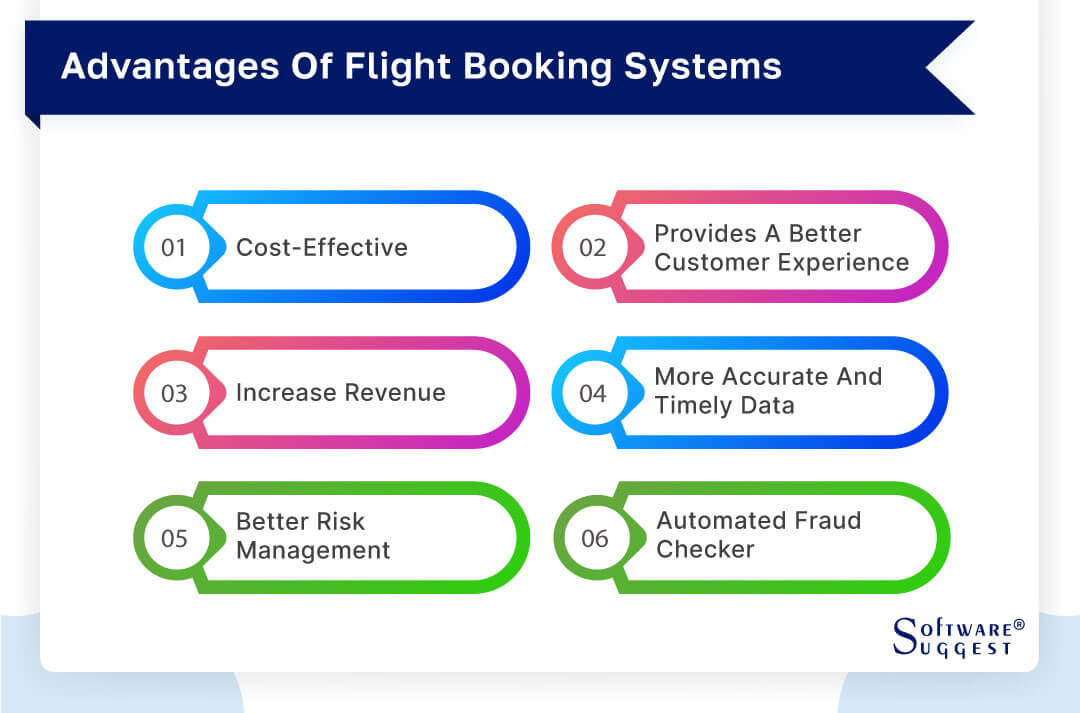
The primary benefits of a flight booking system are it is cost-effective, helps you offer personalized experiences, delivers accurate, real-time data, and improves inventory management.
Let's look at the benefits of a flight booking system in detail.
-
Cost-effective
Flight booking systems are cheaper than hiring full-time employees. Therefore, it will always be more beneficial and cost-effective when you consider what flight software can do (book tickets, manage inventory, send flight updates, accept payments, etc.). Besides, it is available 24/7 at no extra cost.
-
Provides a better customer experience
Today customers want the convenience of booking tickets from anywhere in the world. And that's exactly what an online airline reservation system allows them to do. It lets customers choose their preferred seats and add meals and other add-ons.
-
Increase Revenue
A flight reservation system helps you eliminate commissions that you'd otherwise pay to travel agencies or third-party booking solutions. Furthermore, it allows you to create a frequent flyers program to encourage passengers to book directly from you, thereby increasing your profits.
-
More Accurate and Timely Data
The most important advantage of a flight booking system is that it provides your business with more accurate data. With this, you can make better decisions and be more efficient in your work.
-
Better Risk Management
Risk management is an important part of your business. It helps you to protect both your customers and yourself. Risk management is even more critical when running a flight booking system as it helps reduce the possibility of fraud or human error. This means that it’s less likely that there will be any problems with the booking process and less likely that anything will go wrong on the day of travel.
-
Automated Fraud Checker
One of the most crucial benefits of flight booking system software is automated fraud detection. Because this software is designed to manage and track bookings and other flight data, it can also help identify fraudulent bookings.
Besides, it automatically analyzes passengers' ID proof (Aadhar, Driving License, etc.) to mitigate the chances of fraud.
What are the Features of Flight Software?
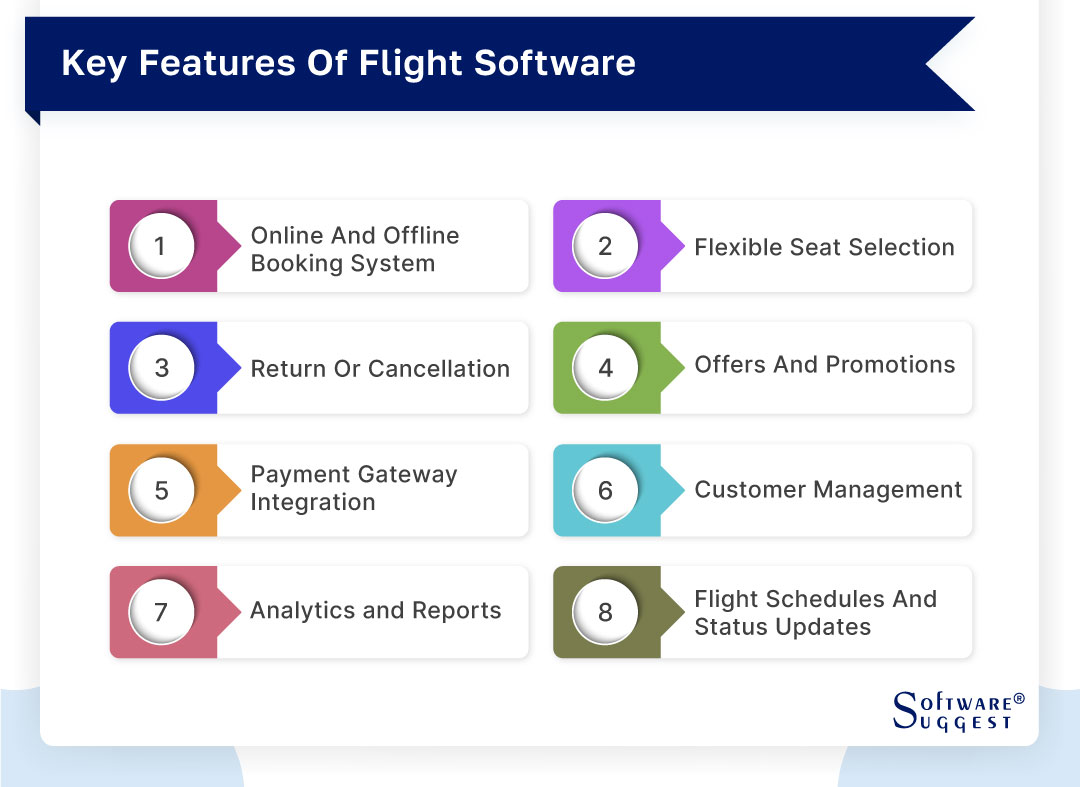
Travel is one of the busiest industries, making it crucial for businesses in the airline industry to choose a system that helps manage their operations and provide good customer service. Here are the key features to look for in airline reservations platforms.
-
Online and Offline Booking System
Allow customers to book flight tickets conveniently online and offline. Your airline system should provide customers access to all the available routes and fares, enabling them to choose the best option. On the other hand, the offline booking process allows your employees to book tickets from anywhere.
It should also generate a PNR number to identify the booking information of a passenger and other details related to the ticket.
-
Flexible Seat Selection
A flexible seat selection feature in airline software helps make your service stand out from the competition. This feature allows passengers to choose their seats before they fly rather than being assigned at check-in and placed throughout the cabin based on availability.
-
Return or Cancellation
The refund will follow the airline's terms and conditions if a ticket is canceled. However, if the passenger has bought a free cancellation or date change add-on during the booking, the flight booking software should allow them to cancel or change their schedule for free.
-
Offers and Promotions
Airlines constantly look for new ways to attract customers, such as discounts and holiday packages. Therefore, your airline booking system must allow you to manage offers and promotions seamlessly.
-
Payment Gateway Integration
The last thing you'd want is customers going away at the last stage of the booking process. Therefore, ensure your system supports multiple payment options, including mobile wallets and UPI.
-
Customer Management
It should have a database to store customers' information, including their names, phone numbers, email addresses, booking history, and interactions with the airline. This will enable you to send personalized offers and increase your conversions.
-
Analytics and Reports
You should be able to view custom reports and data analytics on any aspect of your operation. These include customer behavior, transaction patterns, sales, and revenue reports. You can use these insights to drive decision-making based on customer behavior insights.
-
Flight Schedules and Status Updates
Flight schedules and status updates are two essential features of an airline booking system. Flight schedules and status updates help track a flight's progress, including departure and arrival times, delays or cancellations, gate changes, crew assignments, and more.
How to Select the Right Airline Booking Software?
Selecting the right Flight Booking Software is a critical decision for airlines, travel agencies, and travel management companies, as it directly impacts the efficiency and effectiveness of their flight booking processes. With numerous options available, it's essential to carefully assess various factors to make an informed choice. Here are some key considerations to help you choose the best Flight Booking Software for your needs:
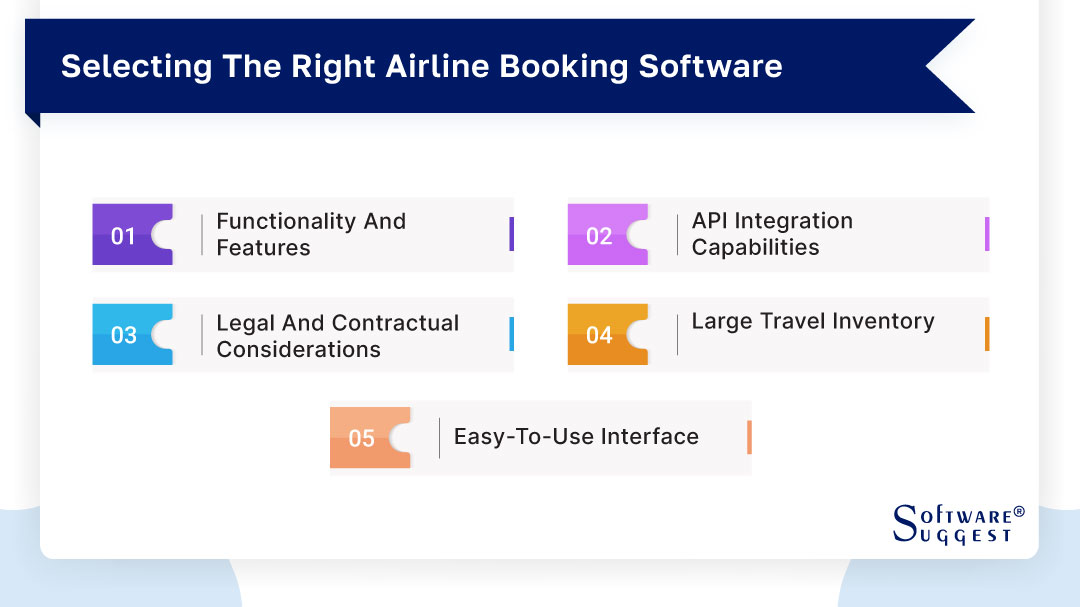
-
Functionality and Features
When evaluating Flight Booking Software, it's crucial to thoroughly examine its functionality and features. Look for a software solution that offers comprehensive booking management tools, seat selection options, fare rules management, and support for ancillary services. The software should be able to handle different types of flights (domestic and international), multiple fare classes, and various payment methods. Additionally, features like real-time flight availability and pricing updates, multi-channel distribution, and reporting and analytics capabilities are highly valuable.
-
API Integration Capabilities
API integration is essential for seamless data exchange between the Flight Booking Software and other systems. Check if the software provides robust API integration capabilities, enabling connectivity with third-party platforms, Global Distribution Systems (GDS), and travel technology providers. Effective API integration allows for a broader inventory of flights and enhances the overall booking experience for customers.
-
Legal and Contractual Considerations
Before finalizing a Flight Booking Software, carefully review the legal and contractual aspects of the agreement. Ensure that the software complies with relevant regulations and industry standards. Thoroughly examine the terms and conditions, service-level agreements, and data privacy policies to safeguard your interests and protect customer data.
-
Large Travel Inventory
Choose a Flight Booking Software with access to a vast travel inventory, encompassing a wide range of airlines and flight options. A diverse inventory increases the likelihood of finding the best flights for your customers and expands your global reach. Consider opting for a system with access to both full-service carriers and low-cost airlines to cater to different customer preferences.
-
Easy-to-Use Interface
An intuitive and easy-to-use interface is crucial for the successful adoption of Flight Booking Software by your staff and customers alike. Look for a user-friendly platform with a well-designed interface, making it simple for reservation agents to navigate and manage bookings efficiently. Similarly, a customer-facing interface should be intuitive, allowing passengers to search for flights, compare fares, and complete bookings with ease.
Top 5 Airlines Reservation System Software Comparison
|
Name
|
Free Trial
|
Demo
|
Pricing
|
|---|---|---|---|
|
14 Days |
Yes |
On Request | |
|
7 Days |
Yes |
On Request |
|
|
10 Days |
Yes |
On Request |
|
|
14 Days |
Yes |
On Request |
|
|
7 Days |
Yes |
Starting price at $99/ Month +3%/ booking |
Airlines Reservation System Software is essential in the quick-paced business of aviation because it helps airlines and travel agencies effectively handle aircraft bookings, maximize revenue, and offer passengers a seamless travel experience.
There are many possibilities, so let's look at the top five airlines' reservation system software that has become well-known for their cutting-edge features and all-encompassing functionalities:
1. Lemax
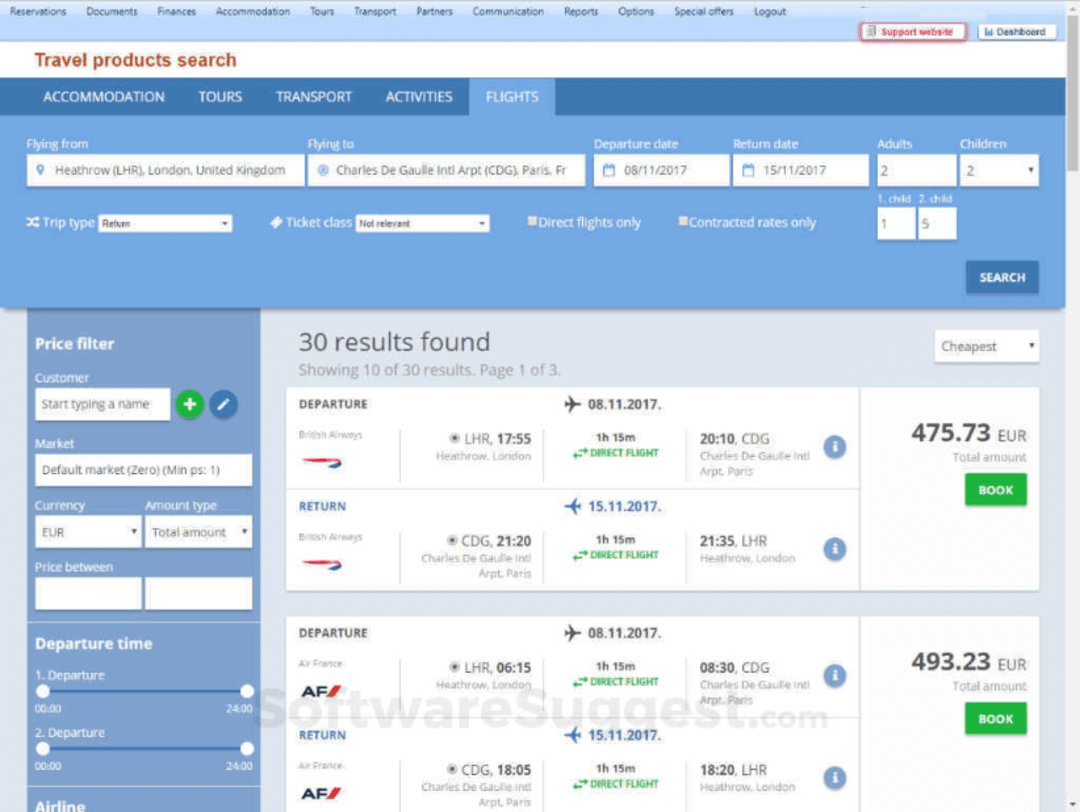
Lemax is a software program for handling reservations and bookings for airlines that offers all-inclusive solutions. It is a user-friendly platform created to simplify the entire booking process, allowing airlines to manage ticketing, seat assignments, and aircraft schedules with ease. Lemax provides features that are useful to both customers and airline operators, including online booking portals, real-time inventory management, and payment processing.
To assist airlines in reviewing performance and making data-driven decisions, the program also provides reporting and analytics tools. Lemax is a useful tool for airlines wanting to optimize their reservation systems and operations because of its broad features, which streamline airline operations and improve the entire customer experience.
- Online booking portals
- Real-time inventory management
- Ticketing and seat allocation
- Flight schedules and operations
- Payment processing
- Customer relationship management (CRM)
- Reporting and analytics
- Ancillary services
- Integration capabilities
- Multi-language and multi-currency support
- Mobile accessibility
- The system is very easy to learn and implement.
- The learning process is very easy and the people that teach you are great, with great disposition and patience to teach you.
- The ease of onboarding and integration with maximum support was very helpful to kick-start rapidly.
- Pasting the texts from Word and formatting is difficult.
- The coders have to do everything for heading, indent, paragraph spacing, etc.
- Every customization is paid in the software.
- The software did not have the feature of creating of a rooming chart and had to pay to build one but that also has limitations.
Pricing
- On Request
2. AeroCRS
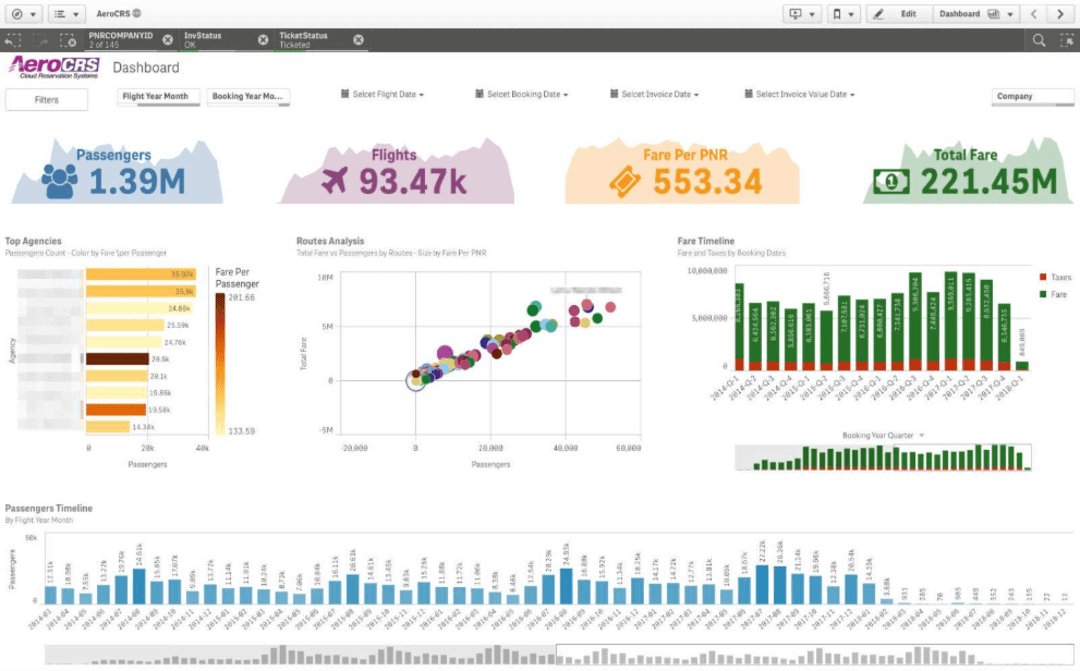
AeroCRS is a sophisticated airline reservation system designed to streamline and optimize the booking and management processes for airlines. It offers a comprehensive set of features, including online booking portals for customers, real-time inventory management, and automated ticketing and seat allocation. The system allows airlines to efficiently manage flight schedules, operational details, and ancillary services, providing customers with a seamless booking experience.
AeroCRS also supports secure payment processing and offers robust reporting and analytics tools to help airlines gain valuable insights into their performance and customer behavior. With its multi-language and multi-currency capabilities, AeroCRS caters to a global audience, making it a powerful and user-friendly reservation system for airlines seeking to enhance their operational efficiency and customer satisfaction.
- Online booking
- Agent and corporate portal
- Payment processing
- Revenue Management
- Third-party booking
- Distribution Management
- Loyalty program
- Departure control system
- Charter reservations
- Digital- marketing solution
- Frequent passenger program
- Internet booking engine
- Affiliate marketplace
- Operations and route management
- AeroCRS often boasts an intuitive and user-friendly interface.
- The system typically offers comprehensive booking management.
- AeroCRS is known for its ability to provide real-time updates on flight availability and pricing.
- The system is designed to integrate with other airline systems, such as accounting, customer relationship management (CRM), and revenue management systems, streamlining overall operations.
- Some airlines may find limitations in customizing the system to suit their unique business processes.
- AeroCRS may face scalability issues if not adequately configured to handle high-traffic demands.
- As with any reservation system, ensuring data security and privacy compliance is critical.
Pricing
- Plus: On Request
- Premium: On Request
- Ultimate: On Request
3. Travelopro
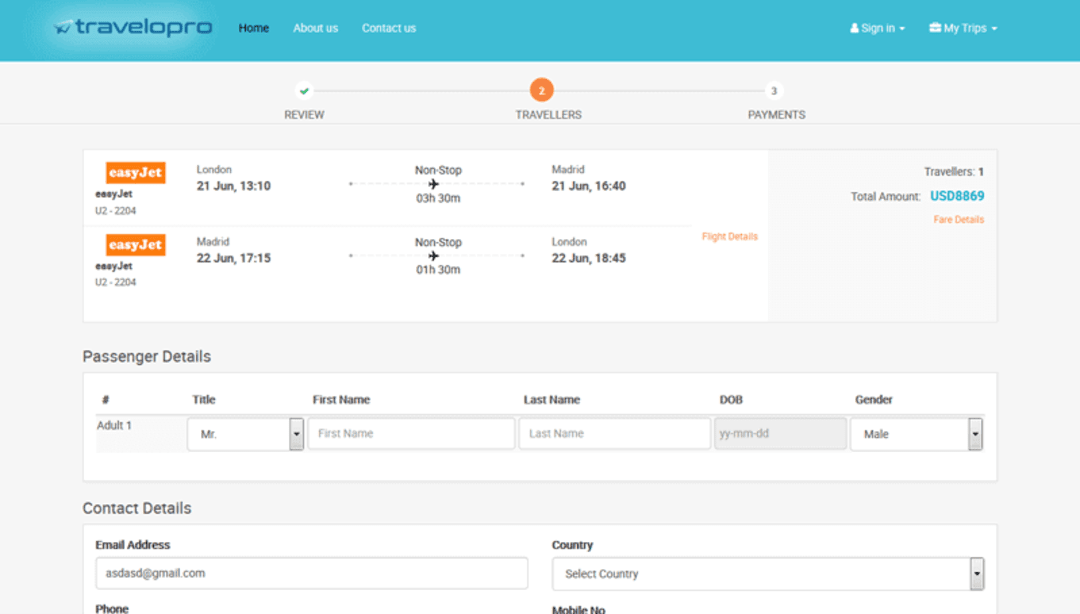
Travelopro is an advanced and comprehensive airline reservation system that offers innovative solutions to streamline and optimize the booking process for airlines. With its user-friendly interface and real-time data updates, Travelopro empowers airline staff to efficiently manage bookings, seat assignments, fare rules, and ancillary services.
This system excels in providing multi-channel distribution capabilities, enabling airlines to offer their inventory through various platforms such as their own website, mobile apps, travel agencies, and global distribution systems (GDS). Travelopro's integration capabilities with other airline systems, such as revenue accounting and customer relationship management (CRM), ensure seamless operations for better airline's inventory, and enhanced customer experiences.
- Travel portals
- B2B travel booking portal
- B2C travel booking portal
- Airline reservation system
- Cruise booking system
- GSD
- Hotel Extranet
- Travel agency software
- Hotel CRS
- Arabic travel booking system
- The development and implementation process is very smooth and delivered the exact results we were expecting
- Travelopro's system has been quick and easy and has a robust supplier portfolio and innovative design.
- The software is easy to learn, loaded with sample content, and makes building beautiful proposals a breeze. The ongoing support is excellent.
- Depending on the specific service level agreement or customer support structure, some users may encounter challenges with timely and effective technical support.
- The overall cost of implementing and maintaining the Travelopro system could be a potential concern for smaller carriers.
Pricing
- Basic: On Request
- Advance: On Request
- Premium: On Request
- Platinium: On Request
- Enterprise: On Request
4. Videcom VRS
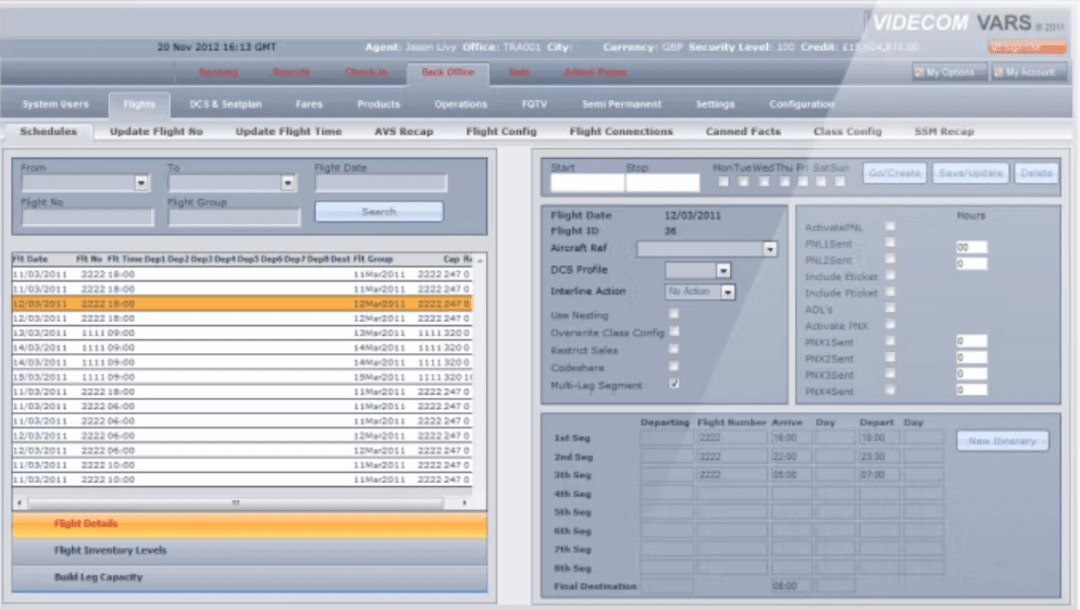
Airlines can effectively manage their reservations and operations with the help of Videcom VRS, an advanced and feature-rich airline reservation system. VRS equips airline workers to handle reservations, seat assignments, fare regulations, and auxiliary services with ease thanks to its user-friendly interface and real-time updates.
The ability of airlines to provide their inventory through a variety of platforms, such as their website, mobile apps, travel agents, and global distribution systems (GDS), is one of Videcom VRS's primary features. The system's ability to integrate with other airline systems guarantees efficient operations and data flow throughout the whole business.
- Booking management
- Seat assignment
- Fare rules and ancillary services
- Real-time availability and pricing
- Multi-channel distribution
- Integration capabilities
- Reporting and analytics
- User-friendly interface
- Ancillary revenue management
- Customer management
- Flight schedule management
- Ticketing and e-ticketing
- The software provides good security.
- The software is very user friendly.
- The software is good for enterprise and company use.
- Sometime the server falls down.
Pricing
- On Request
5. TravelPerk
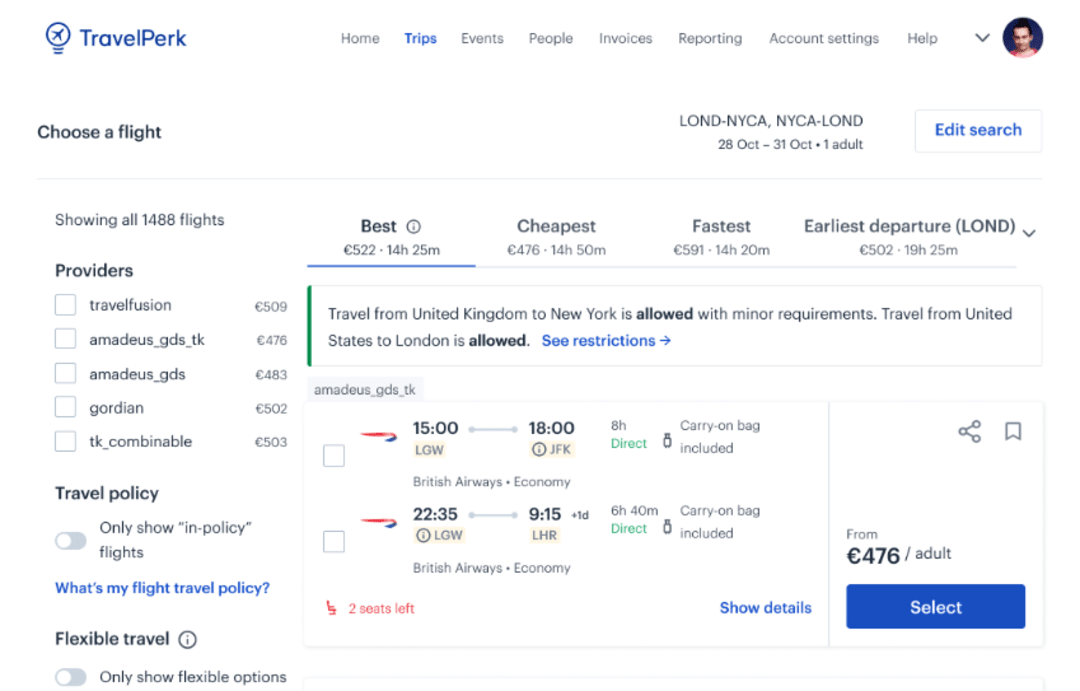
TravelPerk is a modern and innovative airline reservation system that caters to the needs of business travelers and companies alike. It provides a thorough platform for booking flights, lodging, and other travel services, making it a one-stop shop for managing business travel. The user-friendly interface and intuitive design of TravelPerk make it simple for users to search for flights, compare costs, and make reservations without any fuss. The solution gives travelers access to up-to-the-minute information about flight availability and costs in real time.
- Booking management
- Seat assignment
- Fare rules and ancillary services
- Real-time availability and pricing
- Multi-channel distribution
- Integration capabilities
- Reporting and analytics
- User-friendly interface
- Ancillary revenue management
- Customer management
- Flight schedule management
- Ticketing and e-ticketing
- It provides overview of all available airlines and hotels.
- 24/7 support is provided for any required changes.
- There is an option of manager Approval before final booking.
- Organize flights, hotels and ground transportation.
- Sometimes information regarding flight info/ cancellations is delayed.
- Sometimes certain flights don't show up as available for booking.
- Can't book trains for European travel.
Pricing
- Starter Plan: Free
- Premium Plan: $99/ Month +3%/ booking
- PremiumPlan: $299/ Month +3%/ booking
- Enterprise Plan: Custom Pricing
The Common Problems With Airline Ticketing Systems
Flight ticketing systems play a crucial role in managing the complex process of flight bookings and reservations. These systems handle a vast amount of data and facilitate transactions between airlines, travel agencies, and passengers. However, like any technology, they are not without their challenges. Let's explore some common problems that can arise with the best airline ticketing software.
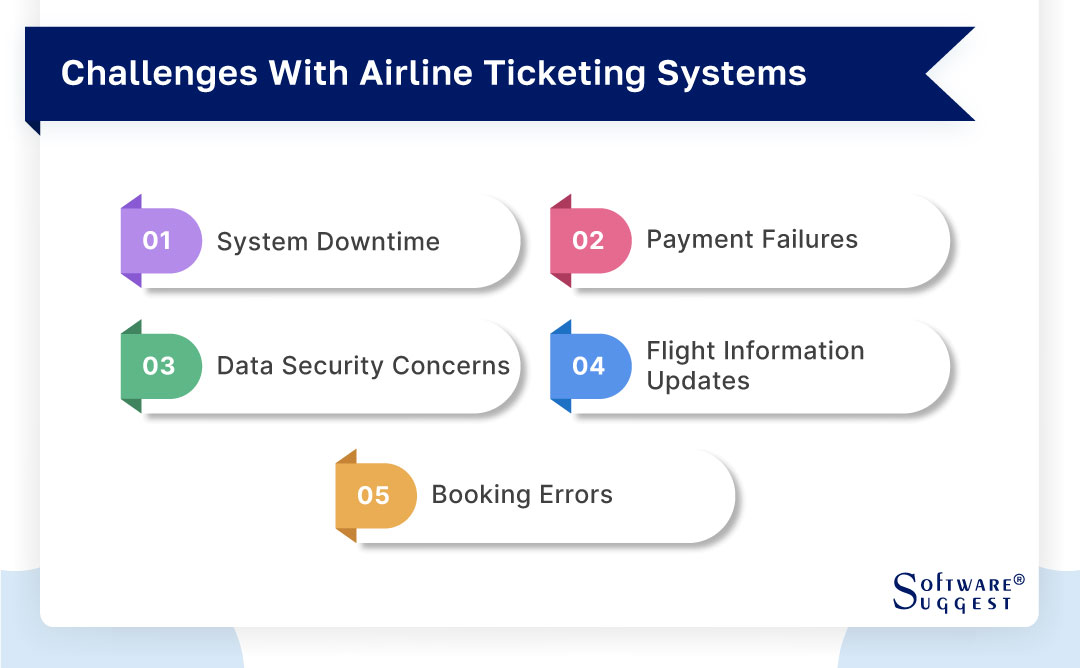
-
System Downtime
One of the most significant challenges faced by Airline Ticketing Systems is system downtime. Technical glitches, server issues, or maintenance activities can lead to temporary unavailability of the system. System downtime can cause frustration among travelers and disrupt the booking process, resulting in missed opportunities and potential revenue loss for airlines and travel agencies.
-
Payment Failures
Payment failures during the booking process can be a frustrating experience for both travelers and businesses. Issues, like declined credit card transactions, payment gateway errors, or connectivity problems, can lead to failed bookings. These failures not only inconvenience passengers but also impact airlines' revenue generation and create customer dissatisfaction.
-
Data Security Concerns
Airline Ticketing Systems handle sensitive customer information, including personal and payment details. Ensuring robust data security and protecting customer data from unauthorized access or cyber threats is of paramount importance. Data breaches can have severe consequences, eroding customer trust and damaging the reputation of airlines and travel companies.
-
Flight Information Updates
Timely and accurate flight information updates are crucial for the booking process and travel planning. Delays or inaccuracies in updating flight schedules, availability, or pricing can lead to confusion and inconvenience for passengers. It is essential for Airline Ticketing Systems to have real-time data synchronization to provide accurate and up-to-date information to travelers.
-
Booking Errors
Booking errors, such as duplicate bookings or incorrect ticket details, can occur due to system glitches or human errors. Resolving these errors can be time-consuming for both passengers and customer service teams. It is crucial for Airline Ticketing Systems to have robust validation mechanisms and user-friendly interfaces to minimize the occurrence of booking errors.
Latest Airline Reservation System Software Trends
As the airline industry continues to evolve, so do the technologies and trends shaping the landscape of Airline Reservation System Software. Airlines and travel companies are constantly seeking innovative solutions to enhance the booking process, improve customer experiences, and optimize operations. Let's explore some of the latest trends in Airline Reservation System Software:
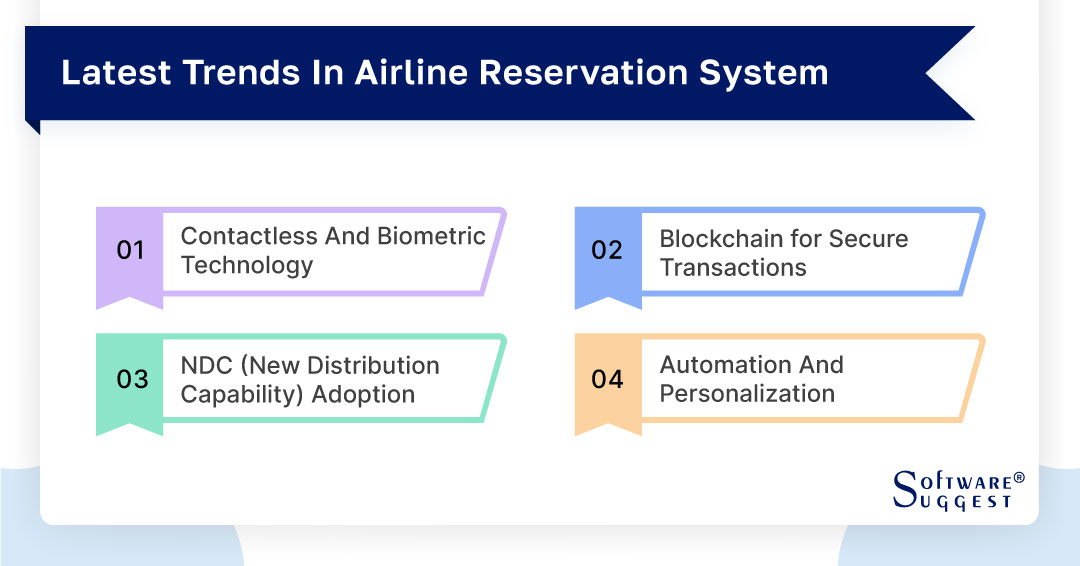
-
Contactless and Biometric Technology
Contactless and biometric technology has gained significant traction in the airline industry, particularly in the wake of the COVID-19 pandemic. These technologies allow passengers to have a touchless travel experience, minimizing physical contact at various touchpoints like check-in, boarding, and security. Biometric verification using facial recognition or fingerprint scanning streamlines the verification process and reduces wait times, enhancing the overall passenger journey.
-
Blockchain for Secure Transactions
Blockchain technology is increasingly being explored for secure and transparent transactions within the airline reservation ecosystem. Blockchain offers decentralized and immutable record-keeping, ensuring the integrity of passenger data and transaction histories. Implementing blockchain in Airline Reservation System Software can enhance data security, prevent fraudulent activities, and improve the efficiency of payment processing.
-
NDC (New Distribution Capability) Adoption
NDC, an industry standard developed by IATA (International Air Transport Association), is gaining momentum as airlines and travel companies seek to modernize their distribution capabilities. NDC enables airlines to offer more personalized and dynamic content to travel agencies and customers directly. By adopting NDC, airlines can provide tailored offers, ancillary services, and upsell options, enhancing customer engagement and revenue generation.
-
Automation and Personalization
Automation plays a crucial role in streamlining airline operations and the booking process. Airlines are increasingly incorporating artificial intelligence (AI) and machine learning (ML) algorithms to automate repetitive tasks, such as customer service inquiries and flight schedule management. Additionally, AI-driven personalization allows airlines to offer tailored recommendations to passengers based on their preferences and past behaviors, enriching the customer experience.
How Much Does Flight Booking Software Cost?
The cost of Flight Booking Software can vary significantly depending on various factors such as the features and functionalities offered, the scale of operations, the size of the airline or travel company, and the level of customization required.
Generally, Flight Booking Software can range from a few thousand dollars for smaller, basic systems to several hundred thousand dollars or even more for comprehensive, enterprise-level solutions. Additionally, there may be ongoing costs, including licensing fees, maintenance, and support expenses. The average cost of flight booking software is $80 to $300.
It's essential for airlines and travel companies to carefully assess their specific needs, conduct thorough research, and engage with software providers to obtain accurate pricing tailored to their requirements.
Conclusion
Airline Reservation System Software has become the backbone of the aviation industry, driving efficiency, revenue optimization, and improved customer experiences. By automating and streamlining various booking processes, airlines can reach a global audience, offer personalized services, and efficiently manage their operations.
From contactless and biometric technology to blockchain integration and NDC adoption, the software industry continues to evolve, providing innovative solutions for airlines and travel companies. As the travel industry advances, staying at the forefront of technology trends and investing in the right Airline Reservation System Software will be vital for airlines seeking sustained growth and success in an ever-changing market.
FAQs
An airline uses a reservation system to manage all its operations, including check-in, boarding, baggage handling, and ticketing. It helps them streamline their operations and automate repetitive tasks, such as issuing boarding passes and web check-in.
The three major parts of an airline ticketing system are the central reservation system (CRS), inventory control system (ICS), and departure control system (DCS). The CRS helps manage flight-related information like schedules, fares, booking requests, cancellations, etc. ICS helps control seat availability and manage fare groups for different classes. Finally, DCS helps process check-ins, control baggage, and generate boarding passes and load sheets.
The process of airline systems starts with the traveler entering their details. They then choose their preferred seat from the available ones (if they don't, a seat will be assigned automatically before boarding) and make the payment to confirm their ticket. On the other hand, flight operators can plan schedules, control slots, and manage customer information.
How long you can hold a flight reservation varies from airline to airline. Most flights allow you to keep your flight reservation for three to seven days. However, make sure to check it on the flight booking platform to avoid any surprises.




